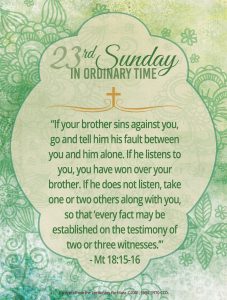 23rd Sunday in Ordinary Time, Year A
23rd Sunday in Ordinary Time, Year A
Ezekiel 33:7-9
Psalm 95:1-2, 6-7, 8-9
Romans 13:8-10
Matthew 18:15-20
Today Jesus gives us guidance on how to respond if someone against us. It begins, as it should to avoid making a mountain out of a mole hill, by speaking with the person one-on-one. We need to realize that maybe they don’t even realize what they did was wrong or the effect it had on us. If we point it out to them, they might immediately realize what happened and be sorry.
If they don’t, then Jesus says to bring one or two witnesses along with us. If the sinner still doesn’t repent, then Jesus says to “tell the church.” If they still don’t repent, “then treat him as you would a Gentile or a tax collector.”
Of course, the steps Jesus offers to us are correct but I think it is important for us to reflect on why we take these steps. Do you bring witnesses just to prove you are right? Do you tell the church just because you want to show that you are right? Being right is not to be our motivation. Neither should judgment or a desire to see the person punished be our motivation.
What should be our motivation?
Our motivation should be to help the sinner become a better person. This should be rooted in our desire to love our neighbor. Our motivation should be for the building up of the Kingdom of Heaven by helping others to become what Christ calls all of us to be.
Of course, the person might not like what we say that. They may think the way they are living their life is fine. That is their choice but we must speak up for what we believe in. Then, the choice is theirs.
Why do I say we must speak up?
Look at what the Lord says to prophet Ezekiel, “You, son of man, I have appointed watchman for the house of Israel.” What does a watchman do?
The watchman would be one who would watch over the city for pending danger from an enemy. In Ezekiel’s days, cities would have appointed a watchman to watch for any coming attack by a foreign power. What is needed in our world today is watchmen who watch for the attack of our greatest enemy, the evil one who brings sin into the world.
In our baptism we are all called to be priest, prophet, and king. That means we need to speak up for justice and what is good. We need to speak against evil.
This can be difficult to do. People might respond by telling us to mind our own business. People want to talk about their freedom of choice. Yet, they don’t want to hear opinions different than their own.
How can anyone really of freedom of choice if they don’t know about the choices that our faith teaches?
If we talk against choices people see as part of their freedom, sometimes what we say gets labelled as “hate speech.” It is not our motivation and must never be our motivation to hate anyone. God loves everyone. In his love, he wants people to make good choices. God asks us to speak in ways that help people make good choices. Our words must be rooted in what Jesus tells us is the second greatest commandment, to love our neighbor.
Does this mean that we need to go up and down the street pointing out every sin we see?
Earlier I referred to the Lord’s words to Ezekiel, “You, son of man, I have appointed watchman for the house of Israel.” In the rest of that sentence the Lord said, “when you hear me say anything, you shall warn them for me. If we ask, the Lord will help us know when to speak up.
The Lord goes on to tell Ezekiel that if He tells Ezekiel to speak up and he doesn’t, that He will hold Ezekiel responsible. However, if Ezekiel does speak up and the person still sins, the Lord will not hold Ezekiel responsible.
Clearly a parent must teach the truth to their children. When asked what we think, we must speak up for the truth. As I have said at others times, silence on our part can be interpreted as agreement. On the other hand, to brand someone as “evil” is not an act of Christian love.
May the Lord always guide to know when to speak up and what words to say so that we can be a voice for Jesus and so that our lives show that we hate the sin but love the sinner.
